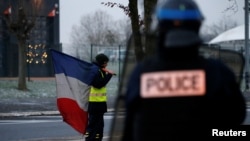Anticipating a fifth straight weekend of violent protests, France's president on Friday called for calm and the Paris police chief warned that armored vehicles and thousands of officers will be deployed again in the French capital.
Police chief Michel Delpuech told RTL radio that security services intend to deploy Saturday in the same numbers as last weekend, with about 8,000 officers and 14 armored vehicles protecting the streets of Paris during a planned anti-government protest by the yellow vest movement.
Delpuech said the biggest difference will be the deployment of more groups of patrol officers to catch vandals, who last weekend roamed the streets around the elegant Champs Elysees, looting and causing damage. Police arrested more than 1,000 people in Paris last weekend and 135 people were injured, including 17 police officers.
French Interior Minister Christophe Castaner also urged protesters to express themselves peacefully after a police shootout on Thursday ended a two-day manhunt for a man suspected of killing four people near a Christmas market in the eastern city of Strasbourg. Hundreds of police were mobilized in the search, which ended with the suspect being shot dead.
"I can't stand the idea that today people applaud police forces and that tomorrow some people will think it makes sense to throw stones at us," Castaner said from Strasbourg.
A sixth "yellow vest" protester was killed this week, hit by a truck at a protest roadblock. Despite calls from authorities urging protesters — who wear the fluorescent safety vests that France requires drivers to keep in their cars — to stop their violence demonstrations, the movement rocking the country since mid-November has showed no signs of abating.
"Last week, we pretty much handled the yellow vests but we also witnessed scenes of breakage and looting by criminals," Delpuech said. "Our goal will be to better control this aspect."
The protests began November 17 against a rise in gas taxes but have morphed into an expression of rage against France's high taxes and a sense that President Emmanuel Macron's government does not care about French workers.
Macron has acknowledged he's partially responsible for the anger and has announced a series of measures aimed at improving French workers' spending power but has refused to reinstate a wealth tax that was lifted to spur investment in France.
On Friday, Macron called for calm and order ahead of another weekend of protests.
"I don't think our democracy can accept" the "occupation of the public domain and elements of violence," Macron said in Brussels, speaking after attending a European Union summit there.
"Our country needs calm. It needs order. It needs to function normally again," Macron said.
He insisted he had heard the protesters' concerns and defended his promises to speed up tax relief. He also dismissed calls for his resignation, which is now among the protesters' disparate demands.
Some trade unions are now calling for rolling strikes across the country.
"The best action is to go on strike," said Philippe Martinez, the head of leftist trade union CGT. "There are inequalities in this country and we need to make big company bosses pay."
One group of yellow vests has urged a non-violent protest on the Place de la Republique in Paris under the slogan "Je Suis Strasbourg" ("I am Strasbourg") to show solidarity with those killed and injured in Strasbourg on Tuesday night.
That refers to the "Je Suis Charlie" motto used by supporters of freedom of speech after a 2015 attack in which 12 people were killed at the French satirical weekly newspaper Charlie Hebdo.
A fourth person died Friday from wounds suffered in an attack on the Christmas market in Strasbourg, as investigators worked to establish whether the main suspect had help while on the run.
Paris prosecutor Remy Heitz, who handles terror cases throughout France, told a news conference seven people are in police custody for the Strasbourg attack, including four family members of suspect Cherif Chekatt.
Chekatt, 29, was shot dead Thursday during a police operation.
"We want to reconstruct the past 48 hours in order to find out whether he got some support," Heitz said.






